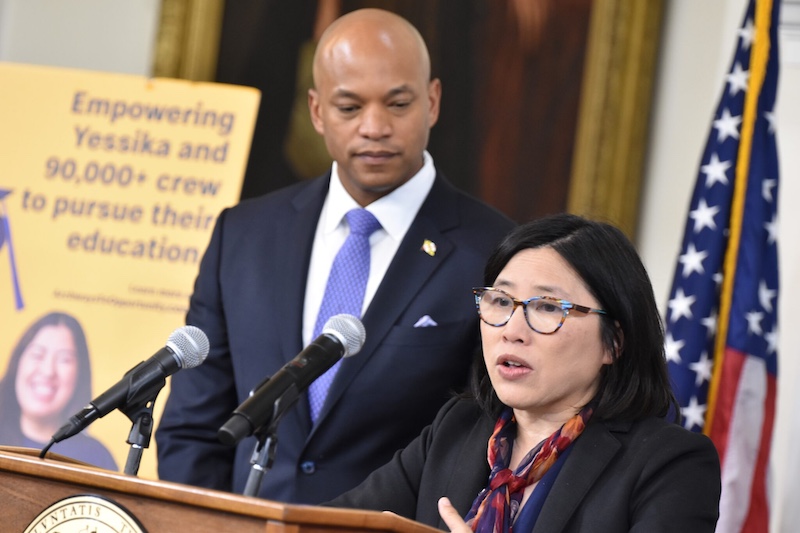Maryland’s unemployment insurance trust fund faces potential solvency issues that could worsen in the wake of massive federal employee layoffs or a recession, lawmakers were told Tuesday.
Labor Secretary Portia Wu told members of the Joint Committee on Unemployment Oversight that the state’s insurance trust fund of $2 billion currently meets federal solvency requirements. But she said that picture could change dramatically with new analysis reflecting economic downturns and unemployment levels that more closely reflect rates during those times.
“Claims levels are at historic lows right now because of the incredibly low unemployment rate,” Wu told the panel. “But again, as I was saying, we don’t anticipate that will continue.”
Wu’s comments included concerns about the potential for a massive displacement of federal workers under President Donald Trump (R). Some early state projections anticipate as many as 29,000 workers could lose their jobs as Trump culls federal agencies and employees.
The briefing came just hours before the U.S. Supreme Court lifted a lower court injunction that had been blocking Trump administration plans to slash federal payrolls.
Tuesday’s briefing was the first in what is expected to be a series of committee meetings leading to the 2026 legislative session.
Sen. Ben Kramer and Del. Lorig Charkoudian, Montgomery County Democrats who co-chair the panel, have sponsored identical bills to modernize the fund. This was the third year such legislation has been proposed. The meetings during the interim are a prelude to a fourth effort next year that could result in updated benefits and potentially changes — even increases — in assessments on employers.
“I think the whole purpose of our getting together and starting to meet now and have this conversation is so that we have a better handle on what’s happening,” Kramer said. “I mean, some of the slides are a little bit scary, and they’re getting my attention.”
Charkoudian worried that abrupt changes in the surcharges on employers that could hit at the same time as an economic downturn that displaces workers.
“So, we talk about how do we fix the roof when the sun’s shining?” Charkoudian asked.
Even if anticipated economic downturns do not occur, Wu said the growing number of workers who are becoming eligible for the maximum weekly benefit is stressing the system to the point where the fund could fall below federal guidelines sometime between 2026 and 2027.
Currently, employers in Maryland pay taxes into the account — $26 per employee with a taxable wage base of $8,500. The rate has remained unchanged since 1992. Unemployed workers can receive a maximum weekly benefit of $430, an amount that has not changed since 2010.
Over time, market changes, inflation and a rising minimum wage have increased wages to the point where workers whose jobs might have earned benefits on the low end of the fund’s scale are moving closer to the maximum benefit.
“What’s happening is everyone is moving towards the ceiling of benefits, but that same thing isn’t necessarily happening to revenue,” Wu said. “So that’s where you start seeing a gap and eventually solvency problems.”
Inflation has also outpaced benefits: A dollar of benefits in 2010 went 24% farther than in 2025, Wu said, while average rents have grown by 30% over roughly the same period.
Mike O’Halloran, state director of the National Federation of Independent Business, said other factors also play a role, and an increase in what businesses pay into the fund would be yet another state-imposed burden.
“Certainly, as legislators, you all are very well aware that some of the costs that businesses have taken,” he said. “Since 2015 … paid sick and safe leave, paid family and medical leave insurance, which has yet to come on board. So, I think when you’re talking about purchasing power, it’s also important to include some of those dynamics that employers are facing since they’re the ones that are funding the trust fund.”
Charkoudian said during the briefing that new rates of $35-$50 per employee might have to be considered. Analysis from Wu’s department — the agency took no public position on any changes — included scenarios that raised the wage base to $15,000 in addition to changes in surcharges.
“I think we all appreciate and value our business and businesses in the state and ensuring their viability,” Kramer said. “But we’re also weighing it against what we’re looking at that’s being forecast, the solvency of the fund.
“I think engaging in this scenario with this body, we’re beginning the conversation,” he said. “So when we do get into session, we have a better handle of where we might want to go and how we do want to address it, keeping in mind all the checks and balances that are important to all of us.”
The unemployment rate in Maryland stood at 3.2% in May. That is higher than the 1.9% in June 2023 but still below the state’s 30-year average of about 5%.
Wu said the unemployment rate is key.
One analysis by the department projects the fund will fall below federal solvency guidelines by 2027 if the state moves back to its average unemployment rate and no changes are made to benefits or taxes levied on employers that feed the fund, Wu said.
An economic downturn, massive number of displaced workers, or a Great Recession scenario would hasten the pace at which the system becomes insolvent.
“We’ve been fortunate that it’s [unemployment] been so low, but I don’t think we can realistically count on it staying below 4% the way it has been, and even if it were to increase to the historical averages, that can create pressure on a fund,” she said.
by Bryan P. Sears, Maryland Matters
July 9, 2025
Maryland Matters is part of States Newsroom, a nonprofit news network supported by grants and a coalition of donors as a 501c(3) public charity. Maryland Matters maintains editorial independence. Contact Editor Steve Crane for questions: [email protected].










